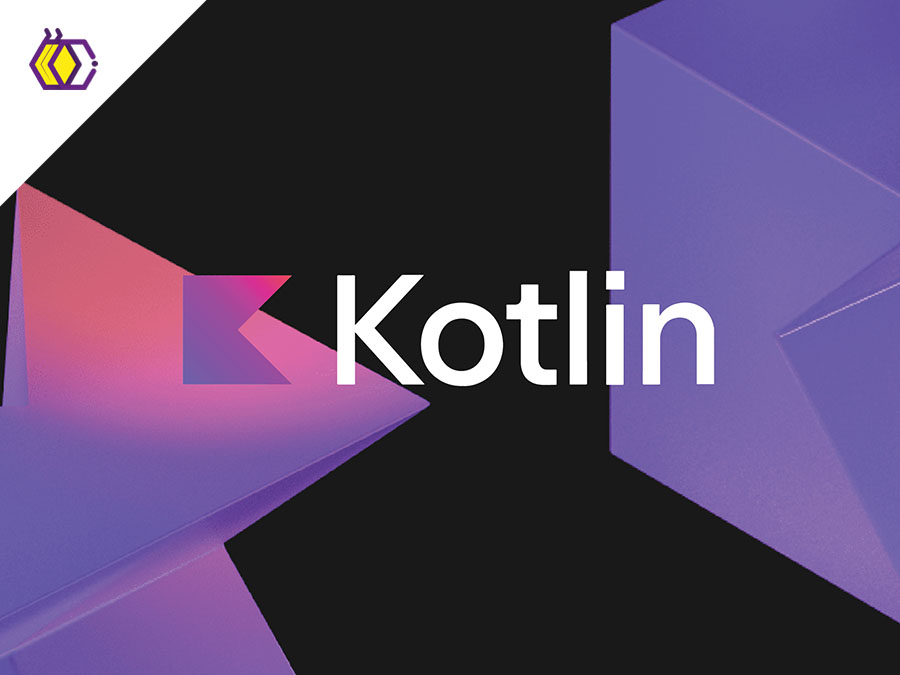

Kotlin
(8 minutes of reading time)
Kotlin was created by JetBrain. It was thought to have the characteristics of the Scala and Java language but eliminating all the disadvantages of these environments.
It is a statically typed, open source, cross-platform, object-oriented programming language.
In 2017 it was announced by Google as the official language of the Android system.
Interested in the subject? Come and read our text today to stay on top of this language that is one of the preferred of large corporations!
KOTLIN: WHAT IS IT?
As we said earlier, Kotlin is a cross-platform open-source programming language, it is multi-paradigm, being totally object-oriented, but with some functional language features, such as lambda functions. It is statically typed and is run by the Java Virtual Machine (JVM). It can be used for web, mobile and desktop development.
Kotlin has many similarities with Java, so it is possible to use Java within Kotlin code.
In 2017, Google teamed up with JetBrains, creators of Kotlin, and today both companies maintain this language through the Kotlin Foundation.
WHY USE KOTLIN?
Kotlin is a lean and intuitive language, it uses about 40% less code to represent the same thing as Java.
Another important feature is the learning curve which is fast and relatively small. However, the less code you must write, the more rules you need to remember. Therefore, Kotlin has a strong idiomatic load, which means that a good part of the time is spent learning how to write code in this language, after having spent the first moments with its basic syntax.
Currently, most programming languages are both functional and object-oriented, and Kotlin is no exception to this rule, supporting both paradigms.
In general, statically typed languages offer two advantages to the programmer. The first is safety and the second is performance.
1) Security: code writing errors are detected during compilation. On the other hand, statically typed languages are stricter, not allowing, for example, a variable to be typed. However, this turns out to be beneficial as it avoids unintentional defects that can lead to system failures or unpredictable behavior.
2) Performance: prior knowledge of types allows machine code optimization. For this reason, statically typed languages tend to be more performant since type checking does not need to be done while the program is running.
Kotlin identify errors at the time of writing the code during compilation, instead of identifying the error at the time of code execution, much later. This makes the language stricter but avoids unintended defects.
Kotlin supports JVM, JavaScript and Native. It can be used on Android and on the web with Spring or any other Java framework. In Android several changes to the original API were distributed through the KTX library so that Kotlin programmers would be more comfortable using the features of this language.
By being JVM compatible, Kotlin becomes viable as a language for web, Android, and Desktop applications, as well as Java. This also means that we can use Java and Kotlin in the same project.
Kotlin can also be compiled to JavaScript via Kotlin/Js. In addition, it has a native library called kotlinx.html, which makes programming front-end web applications easier to write with this language.
Kotlin Native, on the other hand, is a newer project that seeks to make it possible to use Kotlin on more restrictive platforms in terms of running virtual machines, such as iOS.
Nowadays, many big companies use Kotlin, such as: Google, Amazon, Netflix, Pinterest, Uber, Foursquare, etc.
These are some of the development tools that support Kotlin: Spring, Gradle, Vert.x, Spark Java, Codename One, JetBrains, among others.
KOTLIN SYNTAXES
Here's a little bit about Kotlin's syntax:
VARIABLES
There are two main types: val and var.
Val: used to declare constants. It is the most recommended way to declare variables. Requires initialization as soon as it is declared.
Var: declare any variable whose value can be changed. It does not need to be initialized at the time of its declaration.
Both are declared using the pascal notation, which is as follows:
variable_name : variable_type
BASIC TYPES
All basic Java types are present in Kotlin, it is important to say that in Kotlin all types are objects, that is, you only work with Java wrappers, but not with their corresponding primitive types.
- Long: 64-bit integer.
- Int: 32-bit integer.
- Short: 16-bit integer.
- Byte: 8-bit integer.
- Double: 64-bit floating point.
- Float: 32-bit floating point.
- Boolean: Same as Java. It can receive true or false.
- String: in Kotlin, they can be created with double or triple quotes.
- Char: characters are represented by this type and cannot be treated directly as numbers, whether they are integers or floating-point numbers.
CLASSES
Classes in Kotlin are final by default, which means they cannot be extended. The class type is defined as follows:
class ClassName
FUNCTIONS
To declare a function in Kotlin, use the keyword fun followed by the name of the function, followed by parentheses defining the input types of the function. It is also necessary to declare the output type.
fun printER returns(phrase: String): String {
print(phrase);
return phrase;
}
CONDITIONAL EXPRESSIONS
The most common conditional logic mechanism is the if-else structure, common in many other programming languages.
if (/*condition*/ ) {
// code block that will be executed if the condition is true...
} else {
// code block that will be executed if the condition is false...
}
ARRAYS
Unlike Java, Arrays are represented by the Array class which has get and set functions and other useful member functions, in addition to the size property.
val numberSquare = Array(5) { i -> ( i * i ) }
val doubleNumbers = Array (5, { i -> 2 * i } )
KOTLIN / JAVA
Kotlin is fully interoperable with Java, that is, you can use Kotlin whenever you want in any Java project. That's right, in the same project we can have both languages working together.
This relationship is bidirectional, that is, we can insert Java code into a Kotlin project and use the Kotlin code from Java.
APIs that run in Java also run in Kotlin.
Kotlin's syntax, compared to Java, is simpler and more concise and, therefore, is advantageous over Java.
KOTLIN / JAVASCRIPT
Kotlin for JavaScript you can transpile Kotlin code, the standard library, and any supported dependencies into JavaScript, both on the client and server sides.
Kotlin's standard library is available for use through NPM (Node Package Manager), which is the standard Node.js package manager, so the official website recommends using Kotlin/JS through Gradle plugins, which is a dependency manager and building back-end applications based on the JVM.
The kotlin.js and kotlin.multiplataform plugins provide a central and convenient way to configure and control JavaScript-driven Kotlin projects.
KOTLIN / NATIVE
This compiles Kotlin code into native binaries, which can be run without a virtual machine. It is an LLVM based backend for the Kotlin compiler and native implementation of the standard library.
Kotlin/Native is designed to allow compilation for platforms where virtual machines are not possible, such as embedded devices or iOS. It solves situations where a developer needs to produce a standalone program that does not require an additional runtime or virtual machine.
CONCLUSION
As we saw in today's text, Kotlin has grown a lot in the programming market and has been getting more and more support and many contributions from the community, which is growing all over the world. According to Google, over 60% of the top 1000 apps on the Play Store use Kotlin. So, why not start studying more about this language?
beecrowd supports over 20 types of programming languages, including Kotlin! So, use and abuse of beecrowd to improve yourself in this language.
Do you like our content? So, follow us on social media to stay on top of innovation and read our blog.Share this article on your social networks:
Rate this article:
[yasr_visitor_votes size=”medium”]



